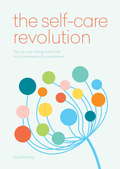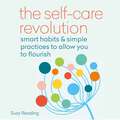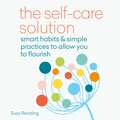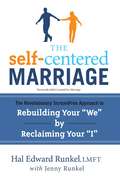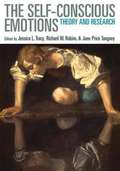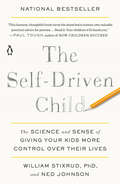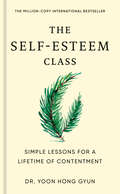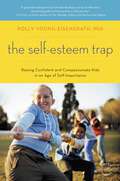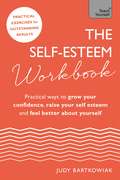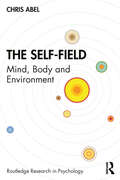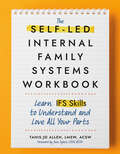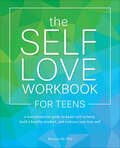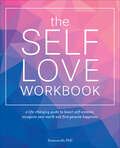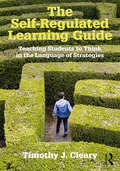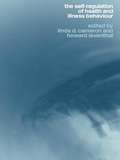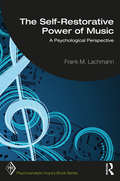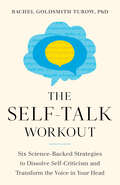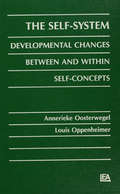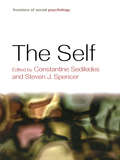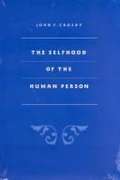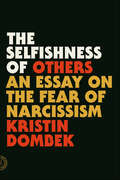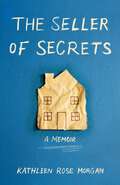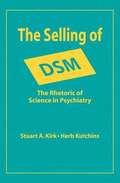- Table View
- List View
The Self-Care Revolution: smart habits & simple practices to allow you to flourish
by Suzy Reading'I love this book!' - Mandy Lehto, Psychologies Magazine What if it were possible to help ourselves thrive, rather than simply survive? The Self-Care Revolution is designed to help and restore your day-to-day energy reserves so that, rather than running on empty, you will have the strength and spirit to excel with whatever life brings. Discover the Vitality Wheel - a complete body and mind Self-Care Toolkit that will boost your health, happiness and resourcefulness.'An inspiring, intelligent, warm and friendly toolkit. One of those books that you'll remember forever.' - Nicola Elliott, founder of Neom Organics'An essential bible of how to live your best life. I can't wait to begin using my Vitality Wheel.' - Anya Hayes'With intimate knowledge of the ways in which we might be struggling, Suzy guides you to a place of innate self-care and kindness without ever overwhelming or over-promising. Inspired.' - Eminé Rushton, Psychologies Magazine Wellness Director
The Self-Care Revolution: smart habits & simple practices to allow you to flourish
by Suzy Reading'I love this book!' - Mandy Lehto, Psychologies Magazine What if it were possible to help ourselves thrive, rather than simply survive? The Self-Care Revolution is designed to help and restore your day-to-day energy reserves so that, rather than running on empty, you will have the strength and spirit to excel with whatever life brings. Discover the Vitality Wheel - a complete body and mind Self-Care Toolkit that will boost your health, happiness and resourcefulness.'An inspiring, intelligent, warm and friendly toolkit. One of those books that you'll remember forever.' - Nicola Elliott, founder of Neom Organics'An essential bible of how to live your best life. I can't wait to begin using my Vitality Wheel.' - Anya Hayes'With intimate knowledge of the ways in which we might be struggling, Suzy guides you to a place of innate self-care and kindness without ever overwhelming or over-promising. Inspired.' - Eminé Rushton, Psychologies Magazine Wellness Director
The Self-Care Revolution: smart habits & simple practices to allow you to flourish
by Suzy Reading'I love this book!' - Mandy Lehto, Psychologies' Magazine Self-care is the future of preventative medicine - daily nourishment that gives us a fighting chance to minimize illness, fatigue, depression and anxiety. Central to the concept of self-care is the idea that taking care of yourself is not selfish and offers essential ways to stress-proof your body and mind, bringing us back from the brink of energetic bankruptcy. Based on the latest scientific research into the mind/body connection, psychologist, yoga teacher and personal trainer Suzy Reading has developed a 'vitality wheel' that offers a complete head, heart and body self-care toolkit that readers can select from according to their needs. Included are 8 evidence-based ways to boost your happiness, energy, resilience and resourcefulness.Each section includes power poses from yoga that enhance and build on the practical advice.(P) 2017 Octopus Publishing Group
The Self-Care Solution
by Suzy Reading'I love this book!' - Mandy Lehto, Psychologies Magazine What if it were possible to help ourselves thrive, rather than simply survive? The Self-Care Revolution is designed to help and restore your day-to-day energy reserves so that, rather than running on empty, you will have the strength and spirit to excel with whatever life brings. Discover the Vitality Wheel - a complete body and mind Self-Care Toolkit that will boost your health, happiness and resourcefulness.'An inspiring, intelligent, warm and friendly toolkit. One of those books that you'll remember forever.' - Nicola Elliott, founder of Neom Organics'An essential bible of how to live your best life. I can't wait to begin using my Vitality Wheel.' - Anya Hayes'With intimate knowledge of the ways in which we might be struggling, Suzy guides you to a place of innate self-care and kindness without ever overwhelming or over-promising. Inspired.' - Eminé Rushton, Psychologies Magazine Wellness Director
The Self-Centered Marriage: The Revolutionary ScreamFree Approach to Rebuilding Your "We" by Reclaiming Your "I"
by Jenny Runkel Hal RunkelIn the best-selling ScreamFree Parenting, Hal Runkel showed thousands of parents how focusing on themselves, in order to keep their cool, can revolutionize their family life. In his groundbreaking new book, The Self-Centered Marriage, Runkel now shows couples how learning to focus on themselves, in order to stay calm in the face of common marital conflicts, is the key to creating a deep, lifelong connection. Every committed couple strives to hold on to the marriage they envisioned back when they first said "I do"--before kids, mortgages, and all of life's inescapable issues seemed to get in the way. But the truth is this: conflict about these issues is unavoidable. What typically results are two spouses feeling forced to compromise themselves in order to just get along and keep it together. Eventually couples start "screaming" at each other--sometimes literally yelling out loud, sometimes shutting themselves down and shutting their partners out. In The Self-Centered Marriage, therapist and bestselling author Hal Runkel introduces some radical new concepts about marriage, teaching couples how to embrace their separate selves as a profound vehicle for strengthening a marriage. Every great marriage is a self-centered marriage because it's a bond between two whole, centered people. Calmly focusing on your own behavior, choices, and moods--which you can control--rather than your spouse's--which you cannot--is the first step toward creating the relationship you really crave. Using accessible anecdotes and disarming humor, Runkel disproves prevailing marital wisdom and reveals a revolutionary path for spouses to be fully themselves, and fully married, at the same time.
The Self-Conscious Emotions
by June Price Tangney Joseph J. Campos Jessica L. Tracy Richard W. RobinsTimely and authoritative, this volume reviews the breadth of current knowledge on the self-conscious emotions and their role in psychological and social functioning. Leading investigators approach the subject from multiple levels of analysis, ranging from basic brain mechanisms to complex social processes. Chapters present compelling advances in research on the most fundamental self-conscious emotions: embarrassment, guilt, humiliation, pride, and shame. Addressed are neural and evolutionary mechanisms, developmental processes, cultural differences and similarities, and influences on a wide array of social behaviors and personality processes. A unique chapter on assessment describes and evaluates the full range of available measures.
The Self-Driven Child: The Science and Sense of Giving Your Kids More Control Over Their Lives
by William Stixrud Ned Johnson&“Instead of trusting kids with choices . . . many parents insist on micromanaging everything from homework to friendships. For these parents, Stixrud and Johnson have a simple message: Stop.&” —NPR&“This humane, thoughtful book turns the latest brain science into valuable practical advice for parents.&” —Paul Tough, New York Times bestselling author of How Children SucceedA few years ago, Bill Stixrud and Ned Johnson started noticing the same problem from different angles: Even high-performing kids were coming to them acutely stressed and lacking motivation. Many complained they had no control over their lives. Some stumbled in high school or hit college and unraveled. Bill is a clinical neuropsychologist who helps kids gripped by anxiety or struggling to learn. Ned is a motivational coach who runs an elite tutoring service. Together they discovered that the best antidote to stress is to give kids more of a sense of control over their lives. But this doesn't mean giving up your authority as a parent. In this groundbreaking book they reveal how you can actively help your child to sculpt a brain that is resilient, and ready to take on new challenges.The Self-Driven Child offers a combination of cutting-edge brain science, the latest discoveries in behavioral therapy, and case studies drawn from the thousands of kids and teens Bill and Ned have helped over the years to teach you how to set your child on the real road to success. As parents, we can only drive our kids so far. At some point, they will have to take the wheel and map out their own path. But there is a lot you can do before then to help them tackle the road ahead with resilience and imagination.
The Self-Esteem Class: Simple Lessons for a Lifetime of Contentment
by Dr. Yoon Hong GyunOVER 1 MILLION COPIES SOLD WORLDWIDE • A step-by-step guide to recovering from low self-esteem and revolutionizing your relationships, career, goals, and life satisfaction—from an internationally renowned expert in self-esteemIf you&’re trying to become your very best and most desirable self but struggling with low self-worth, vicious cycles, and negative scripts, this book is the place to start. The Self-Esteem Class guides you toward a deeper understanding of your own unique value and an internal sense of validation as you define confidence and happiness on your own terms.Dr. Yoon Hong Gyun has dedicated his life to understanding the role of self-esteem in human happiness. With The Self-Esteem Class, a runaway bestseller in his native Korea, he shares everything he&’s learned as a practicing psychologist. His step-by-step method helps readers recover from low self-esteem and build the confidence for lasting contentment. He teaches you to:bring the focus back to yourself and your decisionsovercome vicious cycles and the wounds of your pastharness the energy of your emotionsseparate your own sense of self from other people's judgmentscommit to loving yourself unconditionallyand more!There is no shortcut to contentment, but the secrets revealed in The Self-Esteem Class will transform your outlook on life forever.
The Self-Esteem Trap: Raising Confident and Compassionate Kids in an Age of Self-Importance
by Polly Young-EisendrathKids today are depressed and anxious. They also seem to feel entitled to every advantage and unwilling to make the leap into adulthood. As Polly Young-Eisendrath makes clear in this brilliant account of where a generation has gone astray, parents trying to make their children feel special are unwittingly interfering with their kids' ability to accept themselves and cope with life. Clarifying an enormous cultural change, THE SELF-ESTEEM TRAP shows why so many young people have trouble with empathy and compassion, struggle with moral values, and are stymied in the face of adversity. Young-Eisendrath offers prescriptive advice on how adults can help kids--through the teen and young adult years--develop self-worth, setting them on the right track to productive, balanced, and happy lives.
The Self-Esteem Workbook: Practical Ways to grow your confidence, raise your self esteem and feel better about yourself
by Judy BartkowiakLearn by doing, not just by reading.People of all ages and all walks of life suffer to a greater or lesser extent from low self esteem, even those who appear to radiate confidence. This book will enable you to understand why you have low self-esteem and will address the issues around it by getting to the roots of your self-esteem, setting the goals you want to achieve through enhanced self-esteem and taking practical steps to improve. You will learn how to turn criticism into positive feedback, how to improve your relationships at home and work, how to stay positive and how to communicate clearly and with confidence.ABOUT THE SERIESPeople have been learning with Teach Yourself since 1938. With a vast range of practical how-to guides covering language learning, lifestyle, hobbies, business, psychology, and self-help, there's a Teach Yourself book for everything you want to do. Join more than 60 million people who have reached their goals with Teach Yourself, and never stop learning.
The Self-Esteem Workbook: Practical Ways to grow your confidence, raise your self esteem and feel better about yourself
by Judy BartkowiakLearn by doing, not just by reading.People of all ages and all walks of life suffer to a greater or lesser extent from low self esteem, even those who appear to radiate confidence. This book will enable you to understand why you have low self-esteem and will address the issues around it by getting to the roots of your self-esteem, setting the goals you want to achieve through enhanced self-esteem and taking practical steps to improve. You will learn how to turn criticism into positive feedback, how to improve your relationships at home and work, how to stay positive and how to communicate clearly and with confidence.ABOUT THE SERIESPeople have been learning with Teach Yourself since 1938. With a vast range of practical how-to guides covering language learning, lifestyle, hobbies, business, psychology, and self-help, there's a Teach Yourself book for everything you want to do. Join more than 60 million people who have reached their goals with Teach Yourself, and never stop learning.
The Self-Field: Mind, Body and Environment (Routledge Research in Psychology)
by Chris AbelIn this incisive study of the biological and cultural origins of the human self, the author challenges readers to re-think ideas about the self and consciousness as being exclusive to humans. In their place, he expounds a metatheoretical approach to the self as a purposeful system of extended cognition common to animal life: the invisible medium maintaining mind, body and environment as an integrated ‘field of being’. Supported by recent research in evolutionary and developmental studies together with related discoveries in animal behaviour and the neurosciences, the author examines the factors that have shaped the evolution of the animal self across widely different species and times, through to the modern, technologically enmeshed human self; the differences between which, he contends, are relations of degree rather than absolute differences. We are, he concludes, instinctive and ‘fuzzy individuals’ clinging to fragile identities in an artificial and volatile world of humanity’s own making, but which we now struggle to control. This book, which restores the self to its fundamental place in identity formation, will be of great interest for students and academics in the fields of social, developmental and environmental psychology, together with readers from other disciplines in the humanities, especially cultural theory and philosophy.
The Self-Led Internal Family Systems Workbook: Learn IFS Skills to Understand and Love All Your Parts
by Tanis Allen LMSW, ACSWStep-by-step exercises to guide yourself through the IFS process and create inner harmony and peaceTransform the way you relate to yourself and your mental health struggles with this clear and structured guide to Internal Family Systems (IFS), an evidence-based approach to parts work therapy. The IFS model views every person as having an &“internal family&” of parts or sub-personalities, each with their own set of thoughts, feelings, and needs. These parts hold pain such as trauma and can create difficulties like anxiety or addictions, but when understood and accepted, they can release this pain and heal. Developed by a veteran IFS clinician who has lived, practiced, and trained others on the IFS model for over 25 years, The Self-Led Internal Family Systems Workbook can help you connect to your true, authentic Self—which is always inside of you, ready to lead—so you can meet your internal family of parts, respond compassionately when they act out, and send them healing energy when they need it. Key features of this workbook: Accessible Self-Paced Program. Move through the IFS process at your own speed and comfort level using IFS skills that have been adapted for beginners. Clear and Methodical Approach. Bring clarity and structure to your internal world by navigating it with step-by-step skills, exercises, and worksheets. Strategies for Common IFS Challenges. Learn to work with parts that keep you stuck in problematic cycles and avoid triggering deeply wounded parts. Transcripts of Self-Led IFS Sessions. See how an IFS clinician works with her own parts to address challenges like perfectionism, impulse control, and more.
The Self-Love Workbook for Teens: A Transformative Guide to Boost Self-Esteem, Build Healthy Mindsets, and Embrace Your True Self
by Shainna AliDiscover how to change your attitude, build confidence in who you are, and genuinely love yourself through the guided activities and real-world advice in this easy-to-use, friendly workbook for teens and young adults. As a teen, life can be stressful, whether from worrying about looks, performance in school, relationships with friends and family, or societal pressures. It is easy for you to lose focus and feel like you&’re not good enough. The Self-Love Workbook for Teens gives you the tools to conquer self-doubt and develop a healthy mindset. It includes fun, creative, and research-backed exercises, lessons, and tips, including: Interactive activities Reflective exercises Journaling prompts Actionable advice Self-love is a journey, but it is the first step on the path to a happier, more fulfilling life.
The Self-Love Workbook: A Life-Changing Guide to Boost Self-Esteem, Recognize Your Worth and Find Genuine Happiness
by Shainna AliActivities, prompts, and helpful advice collected to help you better experience the life-changing magic of self-love.You need love from yourself as much as from others. When you have low self-esteem, low confidence or even self-hatred, it’s impossible to live life to the fullest. It’s time to build your self-love and transform your attitude, emotions and overall outlook on life! This helpful workbook allows you to become aware of your own unique needs and goals while discovering how to better accept and love your true self. It includes a variety of constructive and actionable tips, tricks and exercises, including:• Interactive Activitiesexplore a variety of fun and creative ways to love yourself• Reflection Promptsunpack your experiences and connect them to new lessons• Helpful Advicedeepen your understanding of self-love and utilize it in the real worldSelf-love allows you not only to see your true self, but also to truly accept who you are wholeheartedly. With this acceptance comes the freedom and confidence to live your life to its fullest. It’s time to conquer self-doubt and self-sabotage. It’s time to love yourself!
The Self-Regulated Learning Guide: Teaching Students to Think in the Language of Strategies
by Timothy J. ClearyThe Self-Regulated Learning Guide introduces K-12 teachers to the basics of self-regulation. Highly practical and supported by cutting-edge research, this book offers a variety of techniques for seamlessly infusing self-regulated learning principles into the classroom and for nurturing students’ motivation to strategize, reflect, and succeed. Featuring clear explanations of the psychology of self-regulation, these nine chapters provide teachers with core concepts, realistic case scenarios, reflection activities, and more to apply SRL concepts to classroom activities with confidence.
The Self-Regulation of Health and Illness Behaviour
by Linda D. Cameron Howard LeventhalSelf-regulation theory focuses on the ways in which individuals direct and monitor their activities and emotions in order to attain their goals. It plays an increasingly important role in health psychology research.The Self-regulation of Health and Illness Behaviour presents an up-to-date account of the latest developments in the field. Individual contributions cover a wide range of issues including representational beliefs about chronic illness, cultural influences on illness representations, the role of anxiety and defensive denial in health-related experiences and behaviours, the contribution of personality, and the social dynamics underlying gender differences in adaptation to illness. Particular attention is given to the implications for designing effective health interventions and messages. Integrating theoretical and empirical developments, this text provides both researchers and professionals with a comprehensive review of self-regulation and health.
The Self-Restorative Power of Music: A Psychological Perspective (Psychoanalytic Inquiry Book Series)
by Frank M. LachmannThis book explores how we can understand the place of music from a self psychological perspective, by investigating three journeys: the one we take when listening to music, the literal journey of the author from Nazi Germany to the United States, and the subjective round-trip between the past and the present. Drawing on the work of Heinz Kohut, the author examines how music can provide us with a way to reconnect with a sense of self, and how this can manifest in psychological and physical ways. There is particular reference to the work of Richard Wagner, Cole Porter, and Richard Strauss, and an examination of how their music enabled them, in times of stress and crisis, to restore and maintain a more positive sense of self. Finally, the book looks back at the author’s own experiences of music and the place of music in the Jewish world. With clinical excerpts, personal narrative, and sophisticated psychoanalytic insights, this book will appeal to all psychoanalysts wanting to understand the place of music in shaping the psyche, as well as music scholars wishing to gain a deeper appreciation of the psychology of music.
The Self-Talk Workout: Six Science-Backed Strategies to Dissolve Self-Criticism and Transform the Voice in Your Head
by Rachel Goldsmith TurowSelf-talk matters, but what methods of building healthy self-talk actually work? This how-to guide shares evidence-based techniques to go from being your own worst critic to your own best friend. Perhaps you want to be nicer to yourself but don&’t really know how to get there. Or maybe you&’re someone who assumes self-criticism is a permanent part of your personality. Rest assured you&’re not alone—millions of people struggle with the toll that excessive self-criticism takes on their minds, energy levels, jobs, and relationships. And problems with self-talk vary dramatically from one person to the next: they can appear as mild but persistent inner criticism, full-blown self-loathing, or the pain of internalized oppression or abuse. After over twenty years of working with individuals, groups, and classes on self-criticism and related challenges, psychologist and mindfulness teacher Dr. Rachel Goldsmith Turow offers the &“self-talk workout&”—six doable exercises that can help you replace self-criticism with self-kindness and self-encouragement. Specific self-talk strategies such as &“Spot the success,&” &“Fail forward,&” and &“Allowing all feelings, skillfully,&” require just a few minutes a day. These skills can be practiced individually to transform your self-talk, or you can choose to combine two or more exercises to enhance your self-talk workout. Each chapter features a core exercise, variations on the strategy that might feel right for you, scientific studies supporting each approach, and success stories to inspire your own practice. Turow includes examples from her own life and experiences as a psychotherapist, as well as lessons from her students and respected public figures such as Michelle Obama and Thich Nhat Hanh, to show that the burden of harsh self-criticism need not go on forever: the way that we relate to ourselves can be changed.
The Self-system: Developmental Changes Between and Within Self-concepts
by Annerieke Oosterwegel Louis OppenheimerThis book presents a longitudinal study dealing with developmental changes within and between self-concepts and their relation to personal functioning. Within the psychological literature -- and the developmental literature in particular -- the interest in the ideas people hold about themselves and their relation with personal functioning is rapidly growing. This interest is reinforced by the emphasis on individuality in Western society. The self-system is now thought to consist of a collection of self-concepts in which a distinction is made between domain-specific self-concepts -- the real and ideal -- and context-related self-concepts -- the academic, the athletic and the social. It is also considered to be subjective rather than objective. This subjective self involves characteristics such as continuity and distinctiveness from others. These characteristics have been the primary focus of recent research. In existing literature on the development of the self-system, little is known about the structural characteristics -- that is, developmental changes in the interrelationships among domain-specific and context-related self-concepts, or between and within self-concepts. Similarly, little information is available about the relationships between individuals' real and ideal self concepts, their perceived concepts of others, and the actual ideas others have about the same individuals. This book integrates hitherto separate and different components or aspects of self-knowledge into one encompassing, multidimensional self-system.
The Self: Fundamental Theory And Research (Frontiers of Social Psychology)
by Constantine Sedikides Steven J. SpencerThis volume provides a cutting-edge exposition to research on the self. Sixteen authoritative overviews highlight the role of the self around four themes. The first theme is Brain and Cognition, which includes a social neuroscience perspective on the self, implicit self-cognition, the structure of the self and autobiographical memory. The next theme is Motivation, in which chapters include social comparison, self-regulation, narcissism, and modesty. The third theme is Self-esteem and Emotions, covered by chapters on the measurement of self-esteem, terror management theory, sociometer theory, and self-conscious emotions. The final theme concerns the Interpersonal, Intergroup and Cultural Context, containing chapters on intimate relationships, social exclusion, the collective self, and culture. Throughout the volume, the exposition is both scholarly and accessible. It also offers critical assessments along with thoughtful discussions of challenges and problems ahead, as well as the generation of novel hypotheses. As such, the book aspires to influence the research agenda for several years to come. The Self will serve as an essential reference volume for active researchers in the field, while also being appropriate for use as a textbook in advanced courses on the self.
The Selfhood Of The Human Person
by John CrosbyWe often hear it said that "each person is unique and unrepeatable" or that "each person is his own end and not a mere instrumental means." But what exactly do these familiar sayings mean? What are they based on? How do we know they are true? <p><p> In this book, John F. Crosby answers these questions by unfolding the mystery of personal individuality or uniqueness, or as he calls it personal selfhood. He stands in the great tradition of Western philosophy and draws on Aquinas wherever possible, but he is also deeply indebted to more recent personalist philosophy, especially to the Christian personalism of Kierkegaard and Newman and to the phenomonology of Scheler and von Hildebrand. As a result, Crosby, in a manner deeply akin to the philosophical work of Karol Wojtyla, enriches the old with the new as he explores the structure of personal selfhood, offering many original contributions of his own. <p> Crosby sheds new light on the incommunicability and unrepeatability of each human person. He explores the subjectivity, or interiority, of persons as well as the much-discussed theme of their transcendence, giving particular attention to the transcendence achieved by persons in their moral existence. Finally he shows how we are led through the person to God, and he concludes with an original and properly philosophical approach to the image of God in each person. <p> Throughout his study, Crosby is careful not to take selfhood in an individualistic way. He shows how the "selfhood and solitude" of each person opens each to others, and how, far from interfering with interpersonal relations, it in fact renders them possible.
The Selfishness of Others: An Essay on the Fear of Narcissism
by Kristin DombekThey're among us, but they are not like us. They manipulate, lie, cheat, and steal. They are irresistibly charming and accomplished, appearing to live in a radiance beyond what we are capable of. But narcissists are empty. No one knows exactly what everyone else is full of--some kind of a soul, or personhood--but whatever it is, experts agree that narcissists do not have it.So goes the popular understanding of narcissism, or NPD (narcissistic personality disorder). And it's more prevalent than ever, according to recent articles in The New York Times, The Atlantic, and Time. In bestsellers like The Narcissism Epidemic, Narcissists Exposed, and The Narcissist Next Door, pop psychologists have armed the normal with tools to identify and combat the vampiric influence of this rising population, while on websites like narcissismsurvivor.com, thousands of people congregate to swap horror stories about relationships with "narcs."In The Selfishness of Others, the essayist Kristin Dombek provides a clear-sighted account of how a rare clinical diagnosis became a fluid cultural phenomenon, a repository for our deepest fears about love, friendship, and family. She cuts through hysteria in search of the razor-thin line between pathology and common selfishness, writing with robust skepticism toward the prophets of NPD and genuine empathy for those who see themselves as its victims. And finally, she shares her own story in a candid effort to find a path away from the cycle of fear and blame and toward a more forgiving and rewarding life.
The Seller of Secrets: A Memoir
by Kathleen Rose MorganMother was an emotionally damaged woman shrouded in depression and dark secrets. Father was a man plagued by alcoholism who lived in a state of drunken evasion for many years before jumping ship. Kathleen Rose Morgan was born into this troubled family and merged with a community plagued by toxic male aggression, submissive women, wannabe Mafia brutes, charlatan holy men and women, and lurid and criminal goings–on—all made possible by cheek-turners, complicit and fearful enablers, and an ever-present, overarching code of silence.This is the story of the poignant journey Kathleen embarks upon after the long-hidden details of her trauma finally come to light—a quest to seek deep healing through truth, nature, energy medicine, and after-death communication. After a shocking deathbed confession from Mother, Kathleen’s healing path joins an investigation into a shadowy past where the puzzle of repressed memories and childhood secrets is painstakingly assembled. Raw and intense, The Seller of Secrets is a memoir of how early adverse experiences shape a fractured life with limitations, and how freeing oneself from fear and the muteness of shame is the key to true happiness.
The Selling of DSM: The Rhetoric of Science in Psychiatry
by Herb Kutchins Stuart A. KirkIn this book, Kirk and Kutchins challenge the general understanding about the research data and the process that led to the peer acceptance of Statistical Manual of Mental Disorders universally known as DSM-III.
